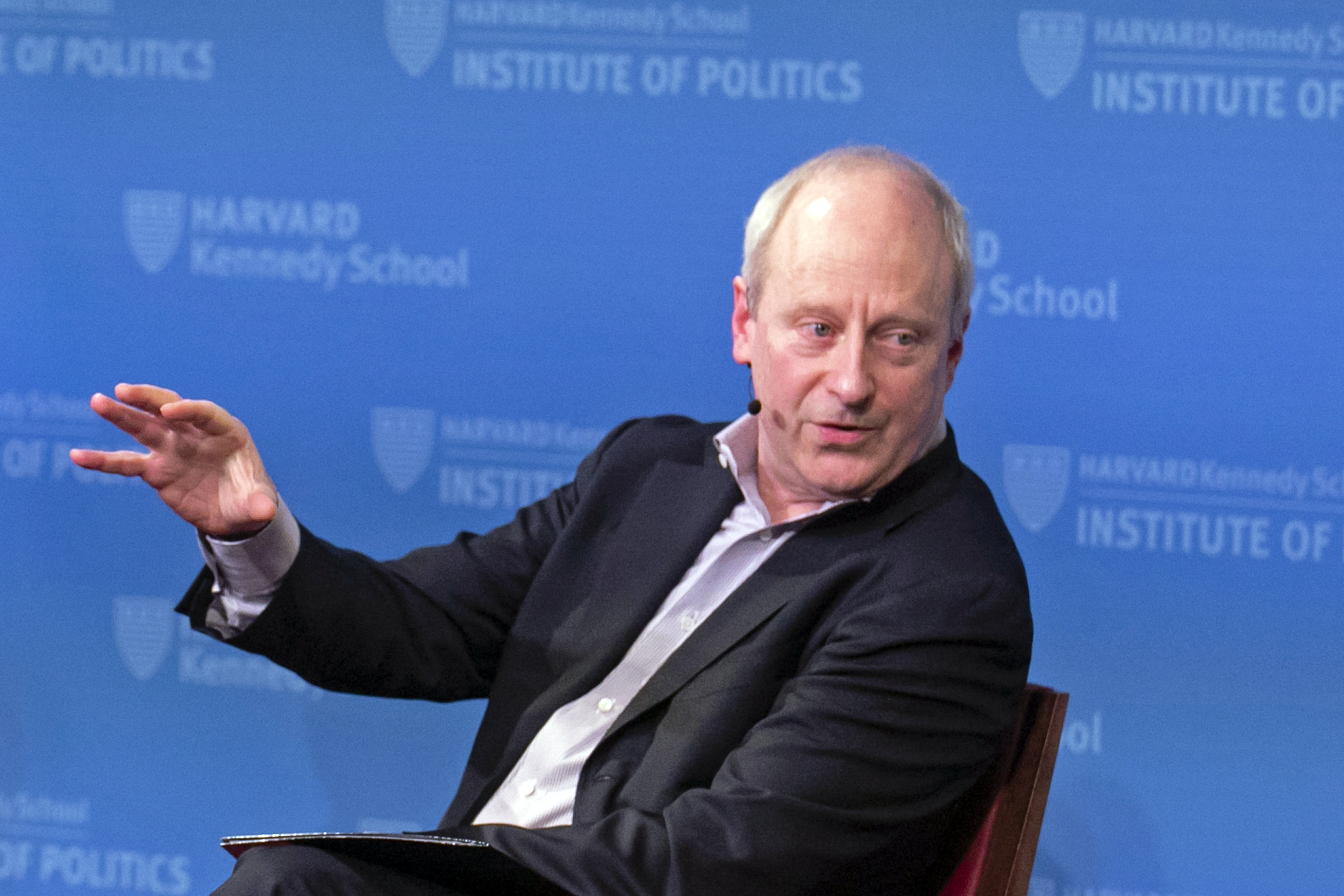
Ideas from Michael Sandel’s 2020 book, “The Tyranny of Merit,” influenced the campaign of Olaf Scholz, the new chancellor of Germany.
File photo by Jon Chase/Harvard Staff Photographer
Seething populist anger and lessons for U.S. in German elections
Michael Sandel’s views of myth of meritocracy lifted new chancellor, may offer hints on way forward here
As Americans reflect on the first anniversary of the Jan. 6, 2021, attack on the U.S. Capitol and the first year of President Biden’s tenure, Michael Sandel says it’s time to understand the deep connections between the rise of populist anger in Western democratic countries and the long-held belief in meritocracy among elite members of those societies.
The Anne T. and Robert M. Bass Professor of Government has argued that over the past 40 years elites in nations like the U.S., U.K., and Germany began incorrectly attributing their success in education and employment solely to their abilities, ignoring their unequal resources and connections. That idea sent a message to working-class people that their lot in life, in turn, was their own fault, leading to resentment and a backlash against those at the top.
The solution, Sandel says, is to dispense with falsely exalted views of meritocracy and focus on fairness and humility in pursuit of a common good — a message that resonated with Olaf Scholz, the new chancellor of Germany. Scholz read Sandel’s 2020 book, “The Tyranny of Merit: What’s Become of the Common Good?,” and held a public dialogue with him prior to the September elections. His campaign, which targeted working-class voters with the slogan “Respect for You,” was influenced by Sandel’s ideas. Sandel recently spoke to the Gazette about the lessons that Scholz’s election and the Jan. 6 attack have for the future of democracy. This interview was edited for clarity and length.
Q&A
Michael Sandel
GAZETTE: It’s been widely reported that your book had a great impact on Olaf Scholz as he tried to revive the Social Democrat party in Germany. What do you think worked well in his outreach to voters?
SANDEL: Scholz recognized that simply encouraging people to clamber up the ladder of success by getting a college degree, at a time when the rungs on the ladder were growing further and further apart, didn’t work in the age of globalization. He focused on renewing the dignity of work, on seeking respect and social recognition for everyone who contributes to the common good, not only those with professional credentials and degrees. This change in tone and emphasis resonated and enabled him to connect with many working-class voters who had been put off by meritocratic credentialism.
“This way of thinking about success entrenches inequality. It has also led to resentment among many working people who believe that elites look down on them.”
GAZETTE: What are some policies that would exemplify this shift in Germany and in the U.S.?
SANDEL: Increasing the minimum wage was one of the policies Scholz emphasized, a policy that has also been on the agenda in American politics. But renewing the dignity of work also requires challenging the steep hierarchy of prestige that valorizes university degrees and depreciates other forms of learning. Germany has a stronger tradition of supporting vocational and technical training, both financially and in according respect and honor to those who go into those fields. In the U.S., we woefully underinvest in those forms of learning. In the book, I quote Isabel Sawhill, an economist at the Brookings Institution, who found that the federal government spends about $162 billion helping people get college degrees, but only about $1.1 billion on vocational and technical training. This disparity reflects not only underfunding of that training, but also the meritocratic preoccupations of the way we govern and the way we allocate resources.
Any serious attempt to renew the dignity of work would need also to strengthen collective bargaining for workers, including in the gig economy. We could also debate the values embedded in the tax code. For example, why should earnings from labor be taxed at a higher rate than earnings from dividends and capital gains? What does this say about our regard for the dignity of work? We might also debate whether to enact a tax on speculative financial transactions and use the revenues to reduce the payroll tax, which is a tax on labor. This would be another way of giving concrete expression to the dignity of work.
“Democratic citizens need to deliberate about what counts as a valuable contribution to the common good, and how the economy should be reconfigured to recognize the contributions that really matter.”
GAZETTE: What effect has the focus on meritocracy had on the public’s relationship with expertise?
SANDEL: The public credibility of experts has been eroded. The experts who most discredited expertise in recent decades were those economists who urged and promoted the version of finance-driven globalization — including deregulation, the free flow of capital, and free trade agreements — that resulted in the outsourcing of jobs, rising inequality, and the financial crisis of 2008. These conditions led to the resentment that produced the backlash in 2016, including the vote for Brexit and the election of Donald Trump.
When the pandemic arose, we desperately needed the expertise of public health experts and medical experts, but the mistrust was already there. So when Dr. Anthony Fauci tells people to wear masks and get vaccinated, he is subject to the same mistrust that was sown by the neoliberal economists of the 1980s through the early 2000s. This is one of the great tragedies that ill-equipped us to contend with the pandemic.
GAZETTE: How has this confluence of issues fed into rising populism and right-wing anger?
SANDEL: In recent decades, the divide between winners and losers has been deepening. This divide is partly about widening inequalities of income and wealth, but it is also about changing attitudes toward success. Those who have landed on top have come to believe that their success is their own doing, and that they therefore deserve the bounty that the market bestows upon the winners. And, by implication, that those who struggle must deserve their fate as well. This way of thinking about success reflects the dark side of meritocracy. It leads to hubris among the winners and to humiliation among those left behind.
This way of thinking about success entrenches inequality. It has also led to resentment among many working people who believe that elites look down on them. Trump exploited this sense of grievance against elites. It’s true that Trump himself was a wealthy reality TV show personality and real estate mogul, so he might seem an unlikely avatar of populist protest. But the grievance he tapped was not resentment of the wealthy, but resentment directed at credentialed, professional, intellectual elites.
It would be a mistake to think that Trump’s defeat will put these grievances to rest. The Jan. 6 attack and the persisting belief among the majority of Republicans that the election was stolen suggest that the threat to democracy will not easily be dispelled. We need to rethink the neoliberal economic policies and meritocratic notions of success that created a society of winners and losers.
GAZETTE: Do the elections of Scholz in Germany and Biden in the U.S. provide any cause for optimism?
SANDEL: Scholz is aware of the need to revive social democracy, to reconnect it to respect for working people and their aspirations, and to build a politics about empowering working people. That’s an encouraging sign. In the U.S., Biden is less enamored of meritocratic credentials, less credulous of neoliberal economists, and less given to the rhetoric of rising than mainstream Democrats and Republicans of the previous four decades. As the first Democratic president in more than 40 years without an Ivy League degree, he is perhaps better able to step back from the meritocratic faith.
The pandemic has highlighted inequalities that existed before and made them more visible. Those of us with the luxury of being able to work from home couldn’t help but recognize how deeply we depend on workers we often overlook — delivery workers, warehouse workers, grocery store clerks, nurse assistants, childcare workers. These are not the best paid or most honored in our society. But we began calling them “essential workers.” This could be an opening for a broader public debate about how to bring their pay and recognition into better alignment with the importance of the work they do.
We often assume that the money people make is the measure of their merit. But this is a mistake. Democratic citizens need to deliberate about what counts as a valuable contribution to the common good, and how the economy should be reconfigured to recognize the contributions that really matter.







